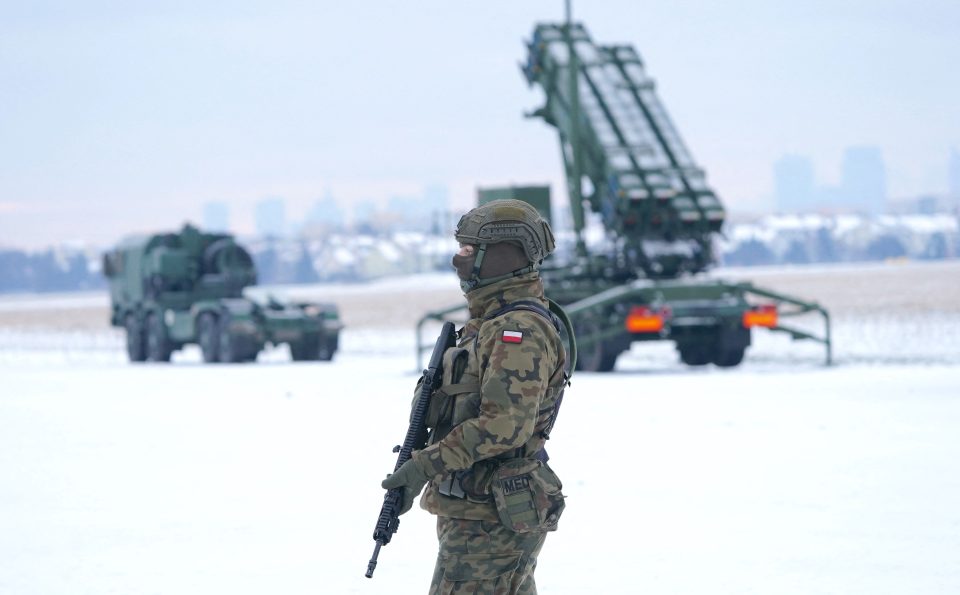FALCON POWERS – Prime ministers Tusk and Mitsotakis say the bloc needs to shield itself amid brewing tensions in Europe’s periphery.
European Commission president Ursula von der Leyen has indicated she will support the Polish and Greek prime ministers’ call for a “European air defence shield” if she secures a second term at the helm of the EU executive.
Speaking during the European Broadcasting Union’s election debate on Thursday, von der Leyen endorsed “an air defence shield for all of Europe, like it was proposed by Mitsotakis and Tusk.”
It comes after Poland’s Donald Tusk and Greece’s Kyriakos Mitsotakis addressed a letter to von der Leyen calling for an EU-wide air shield that would provide the bloc’s airspace with protection from “incoming threats including aircraft, missiles, drones and others.”
The leaders warn that the European Union needs a “bold initiative” to show its “friends and foes” that it is “taking its air defence seriously.”
“Europe will be safe as long as the skies over it are safe,” the prime ministers’ letter reads.
“We must develop a highly capable air defence system which will act as a credible deterrent against all possible aggressors. Which will act as a shield for our citizens and military forces, in case deterrence fails – thereby protecting all member states of the EU and all European citizens.”
📃 ANNOUNCEMENT | Letter from the Prime Ministers of Poland and Greece to the President of the European Commission. "The European Union needs a game changer, a bold initiative that will send a clear and strong message to our friends and foes, to our allies and competitors alike,… pic.twitter.com/t507WtMaBt
— Chancellery of the Prime Minister of Poland (@PremierRP_en) May 23, 2024
Both Tusk and Mitsotakis belong to the same European political family as von der Leyen, the centre-right European People’s Party (EPP). The EPP is comfortably ahead in the polls ahead of June’s European elections, giving von der Leyen a firm chance of continuing as Commission president for the coming five years.
She has made ramping up Europe’s defence capabilities a core tenet of her electoral platform, creating synergies between member states’ defence industries, which are now structured along national lines and have proven insufficient to provide Ukraine with the arms and ammunition it needs to withstand Russia’s full-scale invasion.
Patriots in demand
The need to bolster the EU’s own air defence was put into sharp focus during a summit of EU leaders in April, when Kyiv directly appealed on the bloc’s member states to donate some of their own systems to help it fend off the missiles launched from Russia.
German Chancellor Olaf Scholz and Dutch caretaker Prime Minister Mark Rutte urged member states to look closely at their stockpiles and consider sending their own air defence systems to Kyiv.
Germany had donated one Patriot air defence system, one of the most sophisticated systems of its kind, to Ukraine earlier in April, after Chancellor Scholz buckled under allies’ pressure.
Spain, Greece, and to a lesser extent the Netherlands, Sweden and Romania – the EU countries that have their own Patriots – have since come under pressure to contribute their systems to Ukraine. But capitals are hesitant for fear of debilitating their own defence.
Kyiv has an insufficient number of Patriots, relying instead on other defence systems including Soviet-era surface-to-air missiles (SAMs) such as S-300s.
Poland itself has two Patriot systems, but they are considered necessary given the country’s proximity to Russia and the Russian enclave of Kaliningrad.
In late April, NATO Secretary-General Jens Stoltenberg said allies had “mapped out existing capabilities across the alliance,” adding that there were systems that could be made available to Ukraine.
But since then, capitals have not been forthcoming, for fear of leaving the EU itself vulnerable.
Tusk and Mitsotakis address this “vulnerability” in their letter, adding that bolstering the EU’s capacity to defend its skies would act as a “catalyst” for the “further upgrading of the European defence and security industries.”


